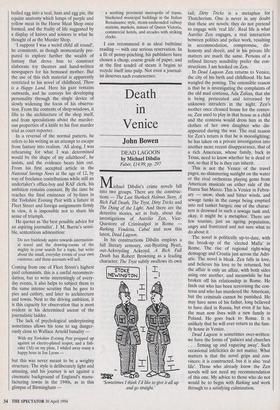Death in Venice
John Bowen
DEAD LAGOON by Michael Dibdin Faber, 04.99, pp. 297 Michael Dibdin's crime novels fall into two groups. There are the construc- tions — The Last Sherlock Holmes Story, A Rich Full Death, The Tryst, Dirty Tricks and The Dying of the Light. And there are the detective stories, set in Italy, about the investigations of Aurelio Zen, Vice- Questore of Criminalpol in Rome — Ratking Vendetta, Cabal and now this latest, Dead Lagoon.
In his constructions Dibdin employs a full literary armoury, out-Byatting Byatt, out-Ackroyding Ackroyd. A Rich Full Death has Robert Browning as a leading character; The Tryst subtly swallows its own 'Sometimes I think rd like to give it all up and go straight.' tail; Dirty Tricks is a metaphor for Thatcherism. One is never in any doubt that these are novels: they do not pretend to engage with 'real life'. Real life is what Aurelio Zen engages, a real interaction between politics and police work, resulting in accommodation, compromise, dis- honesty and deceit, and in his private life matters are much the same. Persons of a refined literary sensibility prefer the con- structions. I am hooked on Zen.
In Dead Lagoon Zen returns to Venice, the city of his birth and childhood. He has wangled the posting. The ostensible reason is that he is investigating the complaints of the old mad contessa, Ada Zulian, that she is being persecuted and terrorised by unknown intruders in the night. Zen's mother once cleaned house for the contes- sa; Zen used to play in that house as a child and the contessa would dress him in the clothes of her own daughter who dis- appeared during the war. The real reason for Zen's return is that he is moonlighting; he has taken on a private investigation into another more recent disappearance, that of a rich American, whose family, back in Texas, need to know whether he is dead or not, so that if he is they can inherit.
This is not the Venice of the travel pages, no shimmering sunlight on the water or the rival orchestras playing gems from American musicals on either side of the Pia7za San Marco. This is Venice in Febru- ary — snow, slush and bitter winds, and sewage tanks in the carnpi being emptied into red tanker barges; one of the charac- ters is drowned in such a sewage tank and, okay, it might be a metaphor. There are few tourists, just an ageing population, angry and frustrated and not sure what to do about it.
The novel is politically up-to-date, with the break-up of the 'elected Mafia' in Rome. The rise of regional right-wing demagogy and Croatia just across the Adri- atic. The novel is bleak. Zen falls in love, and believes his love to be returned, but the affair is only an affair, with both sides using one another, and meanwhile he has broken off his relationship in Rome. He finds out who has been terrorising the con- tessa and who has murdered the American, but the criminals cannot be punished. He may have news of his father, long believed to have died in Russia, but even if he has, the man now lives with a new family in Poland. He goes back to Rome. It is unlikely that he will ever return to the fam- ily house in Venice.
Dead Lagoon is sometimes over-written: we have the forms of 'palaces and churches . . firming up and vagueing away'. Such occasional infelicities do not matter. What matters is that the novel grips and con- vinces; it is constructed, but it is also 'real life'. Those who already know the Zen novels will not need my recommendation of this one. My advice to those who do not would be to begin with Ratking and work through to a satisfying culmination.


























































 Previous page
Previous page